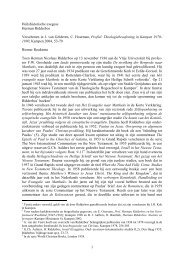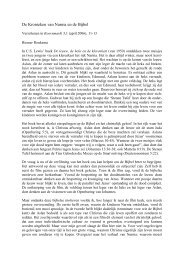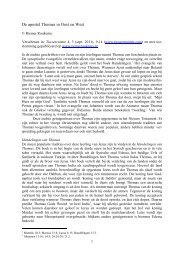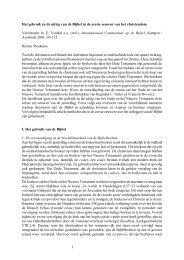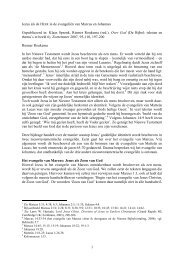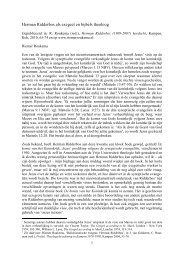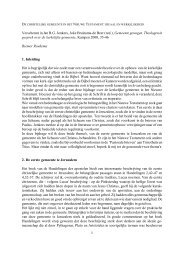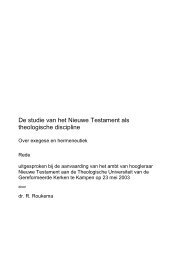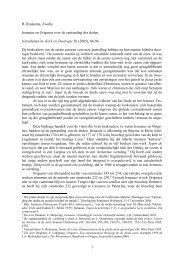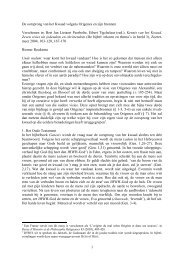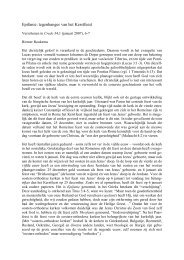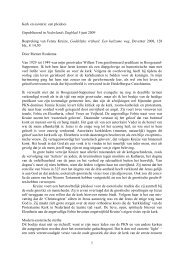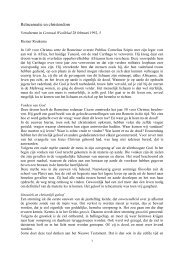Herman Ridderbos‟s Redemptive -historical ... - Riemer Roukema
Herman Ridderbos‟s Redemptive -historical ... - Riemer Roukema
Herman Ridderbos‟s Redemptive -historical ... - Riemer Roukema
You also want an ePaper? Increase the reach of your titles
YUMPU automatically turns print PDFs into web optimized ePapers that Google loves.
nineteenth century he endeavored to demonstrate from the Scriptures the steady<br />
<strong>historical</strong> development of God‟s communion with humankind. He exposited the<br />
Scriptures on the basis of the scheme Weissagung und Erfüllung (“Prophecy and<br />
Fulfillment”), which was the title of his two volumes from 1841-1844, 29 and he<br />
viewed Christ as the center of history and the beginning of its completion. The<br />
Christian partakes in this redemptive history (Heilsgeschichte) by being born again.<br />
Hofmann opposed his “redemptive-<strong>historical</strong>” (heilsgeschichtlich) exposition to the<br />
dogmatic use of Scriptures, which implied that the Bible serves as a collection of<br />
proof texts for Christian doctrine. 30<br />
Hofmann was not the first to pay attention to the <strong>historical</strong> character of<br />
God‟s plan of redemption that enfolds from Creation to the End of times. In fact,<br />
Irenaeus of Lyons designed a redemption-<strong>historical</strong> theology around the year 180. 31<br />
Hofmann‟s attempt to free the Bible from its one-sided dogmatic usage is similar to<br />
J. P. Gabler‟s proposal in 1787 to develop a “Biblical theology” as opposed to<br />
“Dogmatic theology”. 32<br />
Abraham Kuyper, however, rejected Gabler‟s term “Biblical theology”,<br />
partly because it appeared to suggest that the Bible writers had a theology and<br />
worked as theologians, whereas they were first and foremost inspired by the Holy<br />
Spirit. 33 Kuyper therefore suggested that that which Gabler refers to should be called<br />
historia revelationis (history of revelation).<br />
A similarly negative judgement concerning the “redemptive-<strong>historical</strong><br />
method” as proposed by Hofmann was formulated by F. W. Grosheide. 34 He felt it<br />
contains some good elements, but because Hofmann did not view the Scriptures as<br />
<strong>historical</strong>ly completely accurate and also found “the work of man” in it, Grosheide<br />
dismissed his approach.<br />
As a result of this, the subject historia revelationis was taught at the theological<br />
faculty of the Free University at Amsterdam and also at Kampen Theological<br />
Seminary. At Kampen the subject was taught by Old Testament professor Jan Ridderbos.<br />
<strong>Herman</strong> Ridderbos stated in 1994 that what is now called Biblical theology<br />
was then called historia revelationis. 35<br />
29<br />
Weissagung und Erfüllung im alten und im neuen Testamente. Ein Theologischer Versuch I-II<br />
(Nördlingen: C. H. Beck‟sche Buchhandlung, 1841, 1844).<br />
30<br />
See Gustav Weth, Die Heilsgeschichte. Ihr universeller und ihr individueller Sinn in der offenbarungsgeschichtlichen<br />
Theologie des 19. Jahrhunderts (Munich: Kaiser, 1931), 81-94; K. G. Steck,<br />
Die Idee der Heilsgeschichte. Hofmann – Schlatter – Cullmann (Zollikon: Evangelischer Verlag,<br />
1959), 19-35.<br />
31<br />
See P. L. Wansink, Irenaeus en het Oude Testament. Gnostische en heilshistorische exegese in de<br />
tweede eeuw (Zoetermeer: Boekencentrum, 2000).<br />
32<br />
For this see Hendrikus Boers, What is New Testament Theology? The Rise of Criticism and the<br />
Problem of a Theology of the New Testament (Philadelphia: Fortress Press, 1979), 23-38, and Ed<br />
Noort, “Tussen geschiedenis en theologie. Over valkuilen en mogelijkheden in de bijbelse theologie”<br />
Kerk en Theologie 53 (2002): 202-23, esp. 203-7.<br />
33 nd<br />
Encyclopaedie der heilige Godgeleerdheid III (Kampen: J. H. Kok, 1909, 2 ed.), 166-80.<br />
34<br />
Hermeneutiek ten dienste van de bestudeering van het Nieuwe Testament (Amsterdam: Van<br />
Bottenburg, 1929), 120-1.<br />
35<br />
In Gerrit Douma, “Een theologische gemeenschap ten dienste van de kerk. Een gesprek over de<br />
school met prof. dr. <strong>Herman</strong> Ridderbos” Communiqué 11, 2 (1994): 4-16, esp. 7; also in <strong>Herman</strong><br />
Ridderbos, Jan Ridderbos. Mens, 10.<br />
4



